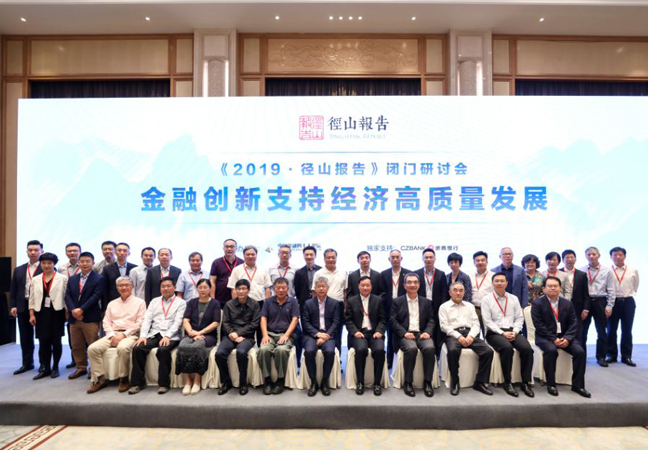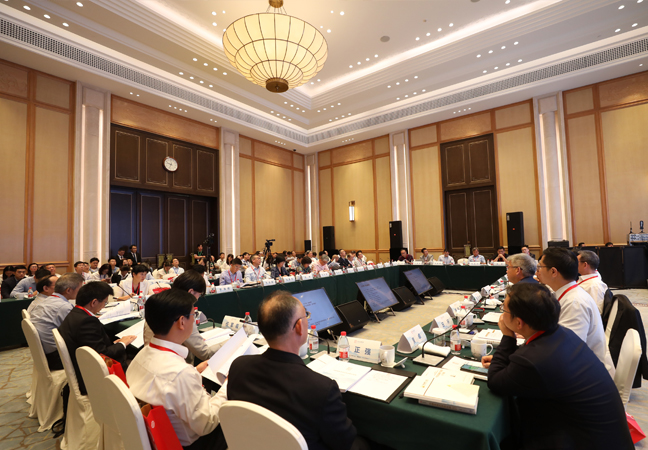
The China Finance 40 Forum (CF40) released the 2019 Jingshan Report on September 22, 2019 in Hangzhou. Marking its third volume, the Report this year focuses on how and what kind of financial innovation can better serve the high-quality development of the economy.

While the growth model of the Chinese economy is witnessing tremendous transformation, the evolution of the underlying financial system has failed to catch up. For the financial sector to better support economic development, it must meet the needs of the real economy in addition to improving financial efficiency and maintaining financial stability. Such needs include the financing needs of innovation-oriented firms, families’ needs for asset-based income and governments’ needs for cost-effective funds. Financial innovation is driven by these needs, and three elements are critical for it to be able to effectively support the high-quality development of the economy – patient capital, proper risk management and tolerance for non-performing loans under clear accountability.
To address these issues, the 2019 Jingshan Report incorporated six individual reports, each concentrating on one specific topic concerning the role of financial innovation in supporting high-quality economic development.
The first report addresses the role of financial innovation in promoting high-quality development from the perspective of optimal financial structure and is authored by Justin Yifu Lin, CF40 Advisor and Dean of the Institute for New Structural Economics at Peking University (PKU). The second report focuses on the role of financial innovation in supporting the innovation in real economy sectors and is led by Tian Xuan, Vice President of the PBC School of Finance, Tsinghua University. The third report is contributed by Yang Kaisheng, CF40 Advisor and former President of the Industrial and Commercial Bank of China. It looks at how the transformation of traditional commercial banks facilitates economic development. The fourth report, which is led by Xiao Gang, CF40 Non-Resident Senior Fellow and former Chairman of China Securities Regulatory Commission, centers on the governance and innovation of China’s shadow banking. The fifth report led by Huang Zhuo and Shen Yan, Deputy Directors of Institute of Digital Finance at PKU, talks about the role of digital financial innovation. Authored by Guo Kai, CF40 Member and Deputy Director-General of Monetary Policy Department at the People’s Bank of China, the sixth report explores the connection between the internationalization of RMB and high-quality economic development.
During a closed-door seminar held before the media release, Huang Yiping, Chairman of CF40 Academic Committee and Deputy Dean of NSD at PKU, who initiated the Jingshan Report program in 2017, pointed out that high-quality economic development needs to be supported by an advanced financial system, which is a crucial precondition for economic innovation. While economic innovation involves innovation of technology, products, business activities and models, financial innovation should seek balance between the long cyclicality and high uncertainty of innovation activities and investor preference for short-term returns.

Overall, the 2019 Jingshan Report put forward eight policy recommendations for improving the effectiveness of financial innovation in promoting the high-quality development of economy-
1. Create a policy, institutional and legal environment that can better support innovation; protect intellectual property rights; implement competitive neutrality; further optimize the legal system for firms’ bankruptcy and restructuring; and establish a market clearing mechanism;
2. Develop an “optimal financial structure” that is compatible with high-quality economic development; develop multi-layer capital markets and encourage financial institutions to better serve innovation activities and SMEs.
3. Reduce direct government control over the capital market and lower policy uncertainties.
4. Explore the synergy between banks and the capital market, and promote the transformation of banks’ service model to one that combines the function of commercial banks and investment banks.
5. Control the pace and intensity of shadow banking regulation to reduce policy distortion; unify regulatory standards for asset management products to mitigate regulatory arbitrage.
6. Expand regulatory coverage to all industries; regulate the business model and activities of the digital financial industry.
7. Internationalization of RMB should serve as the anchor of China’s financial opening; implement transparent and prudent monetary and exchange rate policies; develop a rational system of financial markets and institutions and adopt a negative-list regulatory approach.
8. Adapt the regulatory system to reflect emerging financial innovation; balance the relationship between innovation and stability.
The media release, started with an opening remark by Xu Renyan, President of China Zheshang Bank, featured a Q&A session during which a few questions related to current affairs, such as the China-US trade friction, government’s role in financial innovation, shadow banking and the development of SMEs, were raised.
In response to the question about whether China-US trade tension hampers China’s ongoing efforts to promote financial opening and the global use of RMB, Huang said the precondition of financial opening is the stability of the financial system, and since there is no specific time-table for financial opening, there is no so-called “delay” in this effort. “we push forward steadily when the timing is right and slow down when the timing isn’t so right. The overall direction has always been clear,” he said.
As for the relationship between government intervention and financial innovation, Tian said the key is to seek a balance between the two. While too much and too frequent government intervention can compromise market innovation, reasonable regulation and macro guidance from the government is very necessary to the healthy development of the market. What should be avoided is unnecessary government intervention so that the market can play a decisive role in resource allocation.
Asked about the prospect of shadow banking industry in China, Xiao said while generally the scale of shadow banking industry has decreased in recent years due to measures to regulate noncompliant shadow banks and resolve financial risks, these efforts may continue in years to come, but the “one size fits all” approach must be avoided during the process. While noncompliant shadow banking activities will still be targeted, new assets that meet compliance requirements should be encouraged to increase the supply of financial products and meet individuals’ diversified demand for investment and wealth management.
Yang, who proposed that a policy bank could be set up to provide targeted support to innovation-oriented firms and small and micro firms, said that this is only one of the approaches government can take to encourage the development of these firms. Nevertheless, given the limitation of the existing banking system, the government should devote more fiscal resources, for example, through the policy banks, to help address the financing difficulty of SMEs.
The event was moderated by CF40 Secretary-General Wang Haiming.